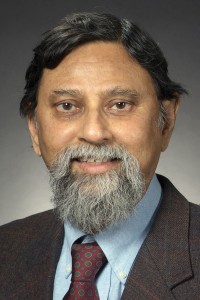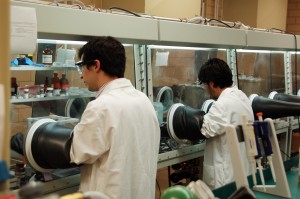
Vikram Dalal’s solar cell research continues to turn heads. Dalal, Thomas M. Whitney Professor in Electrical and Computer Engineering, was awarded the 2012 IBM Faculty Award, his second in as many years. Much of the $38,000 award will go toward building a new deposition system for the solar research teams.
“This award will go a long way,” Dalal says. “We’ll use this year’s award to build up the department’s research infrastructure in this field.”
The IBM Faculty Award is an annual worldwide competitive program intended to foster collaboration between researchers at leading universities and those at IBM. Faculty Awards are cash grants awarded to full-time professors at accredited universities that have an outstanding reputation for contributions in their field or show unusual promise.“You get this award based on the idea proposed and the qualifications you bring to execute the idea,” Dalal says.
Dalal is researching the degradation of organic solar cells and looking at ways to improve stability. Currently, organic solar cells can be expected to degrade by around 30 percent within 100 hours of exposure to light. Since organic solar cells are not especially efficient to begin with, this rapid degradation, combined with the high installation cost of all solar cells, makes organic systems uneconomical. Dalal is working to change this.
“I realized that this was a major problem about two years ago,” Dalal says. “We developed a systematic program to examine the instability of organic solar cells. We wanted to first understand the physics behind it and then come up with ideas to reduce the instability of it.”

Several different researchers, including Dalal, make use of the department’s deposition system at the Microelectronics Research Center. Currently, the system is so heavily used that researchers from ECpE, MSE, Physics and Chemistry are forced to wait in line. A crowded system promotes material contamination across projects and reduces the quality of materials and devices in experiments. Dalal’s award will help remedy the situation.
“We will use a large part of this award to fund a new deposition system and a new measurement system,” Dalal says. “It will increase our productivity and, more importantly, reduce cross contamination coming from other materials.”
Dalal says continuing to build ECpE’s solar cell research infrastructure is an important goal.
“I’ll use awards like this to continuously improve our research infrastructure so we can understand the fundamental science of solar cells and improve their performance.”
